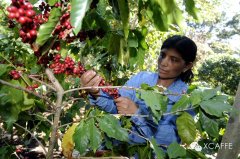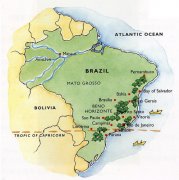The taste of Babu coffee is relatively clean and meticulous. Asian coffee is heavy and high-quality coffee.
When it comes to Asian coffee, the first impression of coffee lovers is often calm and calm. Asian coffee is generally characterized by thick flavor, strong sweetness and round taste, but slightly flat aroma and brightness. It is precisely because of the heavy nature of Asian coffee that it is very suitable to be used as a base when making Italian coffee. The raw coffee beans in Asia are generally processed by wet or semi-wet process. most of the raw beans are uniform, but the color of the beans treated by semi-wet method is darker.
Papua New Guinea (Papua New Guinea) aroma 3.5 minutes brightness 3.5 minutes mellow 3.5 minutes flavor 4.5 points aftertaste 4 points
Suitable for baking: City/Full city New Guinea beans can be baked in a wide range, from soft and well-balanced city to full city with a well-balanced flavor, and even re-baking with oil, depending on your preference.
New Guinea is also an anomaly in Indonesian coffee. Coffee estates are numerous, large and small in scale, and most of the small estates produce washed organic beans with strong flavor but no local flavor. These small estates also produce a small amount of sun beans, which are more varied and delicate than water-washed beans; the taste of large manor coffee is more clean and delicate, but some people think that it has less personality. Basically, Babu coffee is lighter than java beans, somewhat similar to good Central American beans. Most of the coffee trees in the area come from the Tibica seed of the Jamaican Arabica bean, mixed with the Arabica bean from Tanzania. There are also some new hybrids or Indian Ken specialties.

Important Notice :
前街咖啡 FrontStreet Coffee has moved to new addredd:
FrontStreet Coffee Address: 315,Donghua East Road,GuangZhou
Tel:020 38364473
- Prev

Taiwan, China, low-yield, boutique coffee beans, Asian flavor coffee, Taiwan cafe, Taiwan coffee.
When it comes to Asian coffee, the first impression of coffee lovers is often calm and calm. Asian coffee is generally characterized by thick flavor, strong sweetness and round taste, but slightly flat aroma and brightness. It is precisely because of the heavy nature of Asian coffee that it is very suitable to be used as a base when making Italian coffee. Raw coffee beans in Asia are generally processed by wet or semi-wet methods.
- Next

Indian coffee rainy season beans and aged beans Asian boutique flavor coffee products
When it comes to Asian coffee, the first impression of coffee lovers is often calm and calm. Asian coffee is generally characterized by thick flavor, strong sweetness and round taste, but slightly flat aroma and brightness. It is precisely because of the heavy nature of Asian coffee that it is very suitable to be used as a base when making Italian coffee. Raw coffee beans in Asia are generally processed by wet or semi-wet methods.
Related
- Does Rose Summer choose Blue, Green or Red? Detailed explanation of Rose Summer Coffee plots and Classification in Panamanian Jade Manor
- What is the difference between the origin, producing area, processing plant, cooperative and manor of coffee beans?
- How fine does the espresso powder fit? how to grind the espresso?
- Sca coffee roasting degree color card coffee roasting degree 8 roasting color values what do you mean?
- The practice of lattes: how to make lattes at home
- Introduction to Indonesian Fine Coffee beans-- Java Coffee producing area of Indonesian Arabica Coffee
- How much will the flavor of light and medium roasted rose summer be expressed? What baking level is rose summer suitable for?
- Introduction to the characteristics of washing, sun-drying or wet-planing coffee commonly used in Mantenin, Indonesia
- Price characteristics of Arabica Coffee Bean Starbucks introduction to Manning Coffee Bean Taste producing area Variety Manor
- What is the authentic Yega flavor? What are the flavor characteristics of the really excellent Yejasuffi coffee beans?

